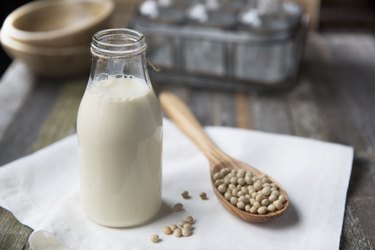
Soy milk does not cause indigestion and bloating in most healthy people. Soy milk is a nondairy beverage that is commonly used to replace dairy milk. The beverage is made from soybeans, water, sugar and flavors and is commonly fortified with calcium and vitamin D.
If you experience indigestion and horrible gas from soy milk and you're searching for bloating relief, you need to make an appointment with your doctor to determine the cause of your symptoms so you get the right treatment. The most common causes of a soy milk stomach ache is a soy intolerance and a soy allergy.
Video of the Day
Video of the Day
Tip
If you get horrible gas from soy milk, then it's possible you're allergic or intolerant to soy. Consult with your doctor for a diagnosis.
Maybe You're Intolerant to Soy
Indigestion and bloating are symptoms related to your digestive system, leading to the possibility that you may have soy intolerance. Soy intolerance occurs when your digestive system is unable to digest the proteins or carbohydrates found in soybeans.
You can have an intolerance to any food if your small intestines fail to create enough digestive enzymes to break down the proteins or sugars contained therein. Soy intolerance will cause stomach pain, cramping, bloating, gas, diarrhea and nausea because the undigested soy proteins cause inflammation in your digestive system.
Read more: Soy Protein Intolerance Symptoms
Is It an Allergy?
A soy allergy is different from soy intolerance and may cause indigestion and bloating. A soy allergy is a serious medical condition because severe soy allergies can cause significant health complications. Soy is one of the most common food allergens.
During a soy allergy, your immune system releases immunoglobulin E antibodies that fight off the proteins found in the soy milk. Even though the soy proteins are safe for consumption, your immune system targets the proteins as invaders.
The release of immunoglobulin E antibodies triggers your mast cells to produce histamine in soft tissues. Histamine leads to inflammation and swelling, causing digestive complications.
Health Concerns With Allergies
Most food allergies will cause more than digestive complications. Food allergies typically affect your entire body and may cause nasal congestion, shortness of breath, wheezing, coughing, hives, skin rashes, diarrhea, vomiting, nausea and lightheadedness.
If you develop more symptoms that affect more than your digestive system, call your doctor immediately. Soy allergies are incurable and treated through elimination and avoidance.
Read more: Should I Be Eating Soy?
Other Gastrointestinal Conditions
If you've been diagnosed with irritable bowel syndrome, you may develop bloating and indigestion from consuming soy milk and other soy products. Soy milk and soy foods contain galactooligosaccharides, which is a type of carbohydrate that may be difficult to digest for some people and lead to bloating, abdominal pain and diarrhea.
IBS is a common digestive condition that causes a range of gastrointestinal symptoms, according to the National Institute of Diabetes and Digestive and Kidney Diseases. While there are numerous causes of IBS-induced abdominal pain, including stress, certain foods may also exacerbate your symptoms.
If you develop chronic diarrhea, constipation or abdominal pain after drinking soy milk, talk with your doctor to discuss your bloating relief options.